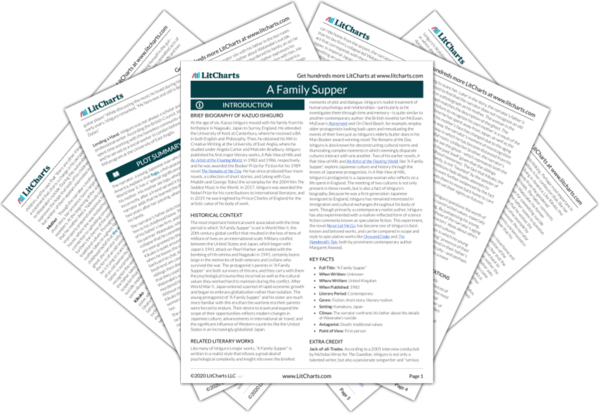Father Quotes in A Family Supper
His general presence was not one which encouraged relaxed conversation; neither were things helped much by his odd way of stating each remark as if it were the concluding one. In fact, as I sat opposite him that afternoon, a boyhood memory came back to me of the time he had struck me several times around the head for ‘chattering like an old woman.
Despite our difference in years, my sister and I had always been close. Seeing me again seemed to make her excessively excited and for a while she did nothing but giggle nervously. But she calmed down somewhat when my father started to question her about Osaka and her university. She answered him with short formal replies. She in turn asked me a few questions, but she seemed inhibited by the fear that her questions might lead to awkward topics. After a while, the conversation had become even sparser than prior to Kikuko’s arrival.
“Those two beautiful little girls. He turned on the gas while they were all asleep. Then he cut his stomach with a meat knife.”
“Yes, Father was just telling me how Watanabe was a man of principle.”
“Father’s become quite a chef since he’s had to manage on his own,” Kikuko said with a laugh. He turned and looked at my sister coldly.
“Hardly a skill I’m proud of,” he said. “Kikuko, come here and help.” For some moments my sister did not move. Then she stepped forward and took an apron hanging from a drawer.
“Surely,” I said eventually, “my mother didn’t expect me to live here for ever.”
“Obviously you don’t see. You don’t see how it is for some parents. Not only must they lose their children, they must lose them to things they don’t understand.”
“During the war I spent some time on a ship rather like this. But my ambition was always the air force. I figured it like this. If your ship was struck by the enemy, all you could do was struggle in the water hoping for a lifeline. But in an aeroplane—well—there was always the final weapon.”
“Already, perhaps, you regret leaving America.”
“A little. Not so much. I didn’t leave behind much. Just some empty rooms.”
“She looks a lot older,” I said.
“It was taken shortly before her death,” said my father.
“It was the dark. I couldn’t see very well.”
The three of us ate on in silence. Several minutes went by.
“Some more?”
“Is there enough?”
“There’s plenty for all of us.” My father lifted the lid and once more steam rose up. We all reached forward and helped ourselves.
“Here,” I said to my father, “you have this last piece.”
“Thank you.”
“Kikuko is due to complete her studies next spring,” he said.
“Perhaps she will want to come home then. She’s a good girl.”
“Perhaps she will.”
“Things will improve then.”
“Yes, I’m sure they will.”

Father Quotes in A Family Supper
His general presence was not one which encouraged relaxed conversation; neither were things helped much by his odd way of stating each remark as if it were the concluding one. In fact, as I sat opposite him that afternoon, a boyhood memory came back to me of the time he had struck me several times around the head for ‘chattering like an old woman.
Despite our difference in years, my sister and I had always been close. Seeing me again seemed to make her excessively excited and for a while she did nothing but giggle nervously. But she calmed down somewhat when my father started to question her about Osaka and her university. She answered him with short formal replies. She in turn asked me a few questions, but she seemed inhibited by the fear that her questions might lead to awkward topics. After a while, the conversation had become even sparser than prior to Kikuko’s arrival.
“Those two beautiful little girls. He turned on the gas while they were all asleep. Then he cut his stomach with a meat knife.”
“Yes, Father was just telling me how Watanabe was a man of principle.”
“Father’s become quite a chef since he’s had to manage on his own,” Kikuko said with a laugh. He turned and looked at my sister coldly.
“Hardly a skill I’m proud of,” he said. “Kikuko, come here and help.” For some moments my sister did not move. Then she stepped forward and took an apron hanging from a drawer.
“Surely,” I said eventually, “my mother didn’t expect me to live here for ever.”
“Obviously you don’t see. You don’t see how it is for some parents. Not only must they lose their children, they must lose them to things they don’t understand.”
“During the war I spent some time on a ship rather like this. But my ambition was always the air force. I figured it like this. If your ship was struck by the enemy, all you could do was struggle in the water hoping for a lifeline. But in an aeroplane—well—there was always the final weapon.”
“Already, perhaps, you regret leaving America.”
“A little. Not so much. I didn’t leave behind much. Just some empty rooms.”
“She looks a lot older,” I said.
“It was taken shortly before her death,” said my father.
“It was the dark. I couldn’t see very well.”
The three of us ate on in silence. Several minutes went by.
“Some more?”
“Is there enough?”
“There’s plenty for all of us.” My father lifted the lid and once more steam rose up. We all reached forward and helped ourselves.
“Here,” I said to my father, “you have this last piece.”
“Thank you.”
“Kikuko is due to complete her studies next spring,” he said.
“Perhaps she will want to come home then. She’s a good girl.”
“Perhaps she will.”
“Things will improve then.”
“Yes, I’m sure they will.”











